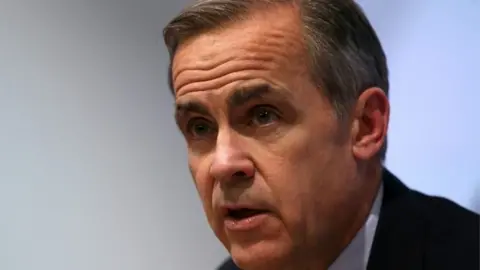Brexit doubts leave firms 'hung out to dry'
 Getty Images
Getty ImagesUK firms have accused the government of leaving them "hung out to dry" in the event of a no-deal Brexit.
With less than 50 days until 29 March when the UK is due to leave the EU, the British Chambers of Commerce (BCC) says 20 key questions remain unresolved.
How to move skilled staff between the UK and EU, which rules to follow, and what trade deals will be in place are all still unknown, the BCC says.
The government said it was focused on getting approval for its Brexit deal.
"I absolutely recognise that for many businesses it is a period of uncertainty and concern," Brexit Secretary Stephen Barclay told BBC Radio 4's Today Programme. "That's why we are so committed to securing a deal."
He said he had already met BCC representatives to discuss the list of key questions.
On the matter of trade tariffs in the event of a no-deal Brexit, he said he expected to be able to give more information "in the coming days".
Theresa May is currently seeking changes to her Brexit deal with the EU after it was emphatically rejected last month, in the largest defeat ever for a sitting government.
The prime minister needs to get a deal approved by Parliament by 29 March to avoid a no-deal Brexit. In that case, in the countries where the UK had no formal trade agreement, both would have to trade under the rules overseen by the World Trade Organization (WTO).
Under this system, every WTO member is free to negotiate its own tariffs - or taxes - on different goods. But under the rules, members have to offer the same tariff to every other WTO country.
The UK has signed "continuity agreements", which mean there will be no disruption to trade, with Switzerland, Chile, The Faroe Islands and Eastern and Southern Africa. As a result free trade agreements currently in place between the EU and those countries will apply to the UK after Brexit.
Mutual recognition agreements - where a product lawfully sold in one country can be sold in another - have also been signed with Australia and New Zealand.
Labour has accused Mrs May of "cynically" running down the clock. It claims the prime minister is planning to delay the final, binding vote on the withdrawal deal she has agreed with the EU until the last possible moment, so that MPs will be faced with a stark choice between her deal and no deal.
Shadow Brexit Secretary Sir Keir Starmer said there was "a growing frustration" around Mrs May's handling of the Brexit process.
"She's coming to Parliament every other week, pretending there's progress, and trying to buy another two weeks," he told BBC Radio Four. "Parliament needs to say 'that's not on'".
'Stifling investment'
The BCC - which represents thousands of firms - says its members are "hugely concerned" that the UK is not prepared for all eventualities.
The business lobby group also warned that the lack of clarity over what will happen had already "stifled investment and growth".
"There is a very real risk that a lack of clear, actionable information from government will leave firms, their people and their communities hung out to dry," said BCC director general Adam Marshall.
Mr Marshall said firms remained "in the dark" over crucial issues including contracts and customs tariffs.
"Businesses need answers they can base decisions on, no matter the outcome," he added.
 PA
PAThe BCC has published the list of 20 questions firms want answered. They include whether firms will be able to fly people and goods between the UK and EU after the end of March and whether there will be any import tariffs.
The business group's warning comes after Bank of England governor Mark Carney earlier urged MPs to solve the current Brexit impasse.
Mr Carney warned a no-deal Brexit would create an "economic shock" at a time when China's economy is slowing and trade tensions are rising.
"It is in the interests of everyone, arguably everywhere" that a Brexit solution is found, he said.
Earlier this week, official figures showed that the UK economy had expanded at its lowest annual rate in six years last year, with many economists blaming Brexit for the slowdown.
